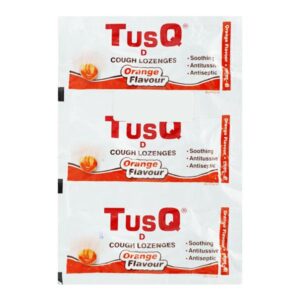DEXTROMETHORPHAN + AMYLMETACRESOL
Dextromethorphan: Dextromethorphan is a medication primarily used as a cough suppressant. It belongs to the class of drugs called antitussives, which work by inhibiting the cough reflex in the brain. Dextromethorphan is available in both over-the-counter cough formulations and prescription medications.
The exact mechanism of action of dextromethorphan is still not fully understood. It is believed to work by binding to and blocking NMDA receptors in the brain, which reduces the transmission of cough signals. Dextromethorphan also acts on opioid receptors to a lesser extent, which accounts for its mild analgesic effects.
The dose of dextromethorphan varies depending on the specific formulation and strength. For over-the-counter cough syrups, the typical recommended dosage is 10-20 mg every 4-6 hours for adults and 2.5-15 mg every 4-6 hours for children aged 6-12 years. Prescription formulations may have different dosing instructions depending on the reason for use.
Common side effects of dextromethorphan include dizziness, drowsiness, nausea, and gastrointestinal upset. Higher doses or misuse of the drug can lead to more serious side effects such as respiratory depression, hallucinations, confusion, and even overdose. It is important to always follow the recommended dosage and avoid combining dextromethorphan with other medications that can potentiate its effects, such as central nervous system depressants like alcohol or benzodiazepines.
It is crucial to note that dextromethorphan abuse has been reported, especially among adolescents seeking its psychoactive effects. Misuse of high doses can lead to dissociative effects, hallucinations, and potential addiction. Therefore, it is important to use dextromethorphan responsibly and as directed by a healthcare professional.
Amylmetacresol: Amylmetacresol is an antiseptic medication primarily used in the treatment of sore throat and mouth infections. It is a yellowish crystalline substance with a faint characteristic odor.
The exact mechanism of action of amylmetacresol is not fully understood. However, it is believed to exert its antiseptic effects by disrupting the cell membranes of microorganisms, leading to their death or inhibition of their growth.
Amylmetacresol is usually available in the form of lozenges or throat sprays. The recommended dose for adults and children over 12 years old is one lozenge or spray every 2-3 hours, up to a maximum of 8 doses per day. It is important to follow the instructions provided by the healthcare professional or the product label.
Common side effects of amylmetacresol may include a temporary numbness or tingling sensation in the mouth, mild throat irritation, and rarely, allergic reactions such as itching or rash. If any severe or persistent side effects occur, it is advisable to seek medical attention.
It is important to note that amylmetacresol is an over-the-counter medication and should not be used for more than 3 consecutive days without consulting a healthcare professional. If symptoms worsen or do not improve after this period, further medical evaluation may be necessary.

